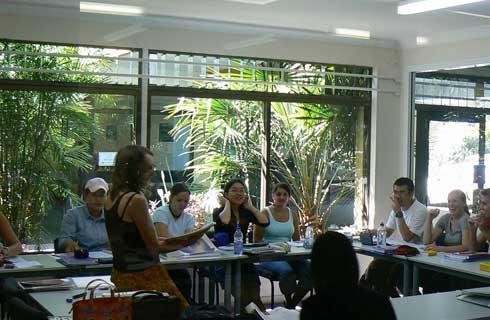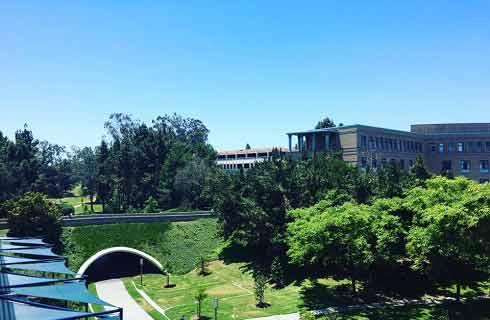- IDP China>
- 课程库>
- 自然科学>
- 自然科学与物理学>
- 地球科学>
- Bachelor of Science and Bachelor of Laws - Soil Science and Hydrology
理学学士和法学学士-土壤科学与水文学
Bachelor of Science and Bachelor of Laws - Soil Science and Hydrology

学历文凭
Dual Degree

专业院系

开学时间

课程时长

课程学费

国际学生入学条件
IDP—雅思考试联合主办方

雅思考试总分
- 雅思总分:
- 托福网考总分:
- 托福笔试总分:
- 其他语言考试:
CRICOS代码: 016237C
申请截止日期: 请与IDP联系 以获取详细信息。
课程简介
Soil and water security are major human existential challenges to the planet and more so in Australia, being the driest continent with highly weathered soils.The Soil Science and Hydrology major provides students with training in three key areas; soil, water and climate, and their links with functional, resilient and productive ecosystems.Soil, water and climate define the physical constraints to ecosystems, and the interpretation of these along with their costs and benefits supports the development of policy and sustainable management strategies.This knowledge will help secure our soil and water resources to maintain healthy, functional and productive ecosystems. We will explore the complex interaction between soil, water and climate, and the way we manage our landscapes. Ecosystems are considered across paddock to catchment scales and include all sectors from agriculture to forestry to mining to nature reserves.This major has a strong emphasis on field-based learning through field schools and emphasis on field measurement and modelling through analysis of non-spatial and spatial data. Working with case studies and projects, you will identify and analyse real-world problems with the aim of identifying options to maintain the functionality of these interrelated systems. Students will develop generic skills in GIS, laboratory and data analysis that will enable students to contribute to water and soil security.The Soil Science and Hydrology major provides students with training in three key areas; soil, water and climate, and their links with functional, resilient and productive ecosystems. Soil, water and climate define the physical constraints to ecosystems, and the interpretation of these along with their costs and benefits supports the development of policy and sustainable management strategies. This knowledge will help secure our soil and water resources to maintain healthy, functional and productive ecosystems. We will explore the complex interaction between soil, water and climate, and the way we manage our landscapes. Ecosystems are considered across paddock to catchment scales and include all sectors from agriculture to forestry to mining to nature reserves. This major has a strong emphasis on field-based learning through field schools and emphasis on field measurement and modelling through analysis of non-spatial and spatial data. Working with case studies and projects, you will identify and analyse real-world problems with the aim of identifying options to maintain the functionality of these interrelated systems. Students will develop generic skills in GIS, laboratory and data analysis that will enable students to contribute to water and soil security.
相关申请
 预科
预科 奖学金
奖学金 实习机会
实习机会 在校学习
在校学习 跨境学习
跨境学习 校园授课-线上开始
校园授课-线上开始 在线/远程学习
在线/远程学习
开学时间&学费
学费信息仅供参考,请与IDP联系以获取详细信息
| 开学时间 | 时长 | 学费 | 地点 |
|---|
学校排名

世界排名60
数据源:
泰晤士高等教育世界大学排名
关于悉尼大学

位于澳大利亚首都的悉尼大学是举世闻名的机构,一直名列世界前20名大学之列(2024年QS世界大学排名)。在2022年QS毕业生就业能力排名中,悉尼大学的毕业生也位居澳大利亚第一和世界第四。来自世界各地的学生进行本科和研究生水平的学习。学生可以在澳大利亚最广泛的课程和学科中选择。该大学提供超过400个学习领域供学生选择,大学5门学科位居世界前十名,另外还有28门学科位居世界前50名(2022年QS世界大学学科排名)。通过实习和工作经验以及通过大学海外项目进行国际交换(包含在学位内的可选项目),从而增加了学生的就业机会。学生将在支持和启发的环境中学习和发展,大学会提供给学生大量的服务,这包括学术和专业支持,残疾服务,保密咨询服务,健康服务还有财务援助办公室提供服务。学生还可以参加由悉尼大学学生会(USU)运营的250多个校园俱乐部和社团,从体育运动到文化团体应有尽有。校园内有许多可供学生使用的设施,其中包括带奥林匹克规格温水游泳池的健身室和攀岩中心。此外,还有美术馆、博物馆、咖啡馆、餐厅和酒吧供学生休闲。学生还可以使用南半球最大的学术图书馆。悉尼是世界上最优秀的城市,根据《经济学人》2021年安全城市指数显示,悉尼被评为第四大最安全的居住地,当地的学生体验得以丰富和提升。
本校相关课程

Graduate Certificate in Clinical Dentistry - Advanced Restorative
学历文凭
Graduate Certificate
开学日期
课程费用总额


Graduate Diploma in Clinical Dentistry - Advanced Restorative
学历文凭
Graduate Diploma
开学日期
课程费用总额


城市和区域规划研究生文凭
学历文凭
Graduate Diploma
开学日期
课程费用总额


教育硕士
学历文凭
Masters Degree (Coursework)
开学日期
课程费用总额


专业工程学硕士(电力)
学历文凭
Masters Degree (Coursework)
开学日期
课程费用总额


专业工程学硕士(电信)
学历文凭
Masters Degree (Coursework)
开学日期
课程费用总额

其他相关课程

莫纳什大学预科课程-扩展
 蒙纳士学院
蒙纳士学院学历文凭
Foundation
开学日期
课程费用总额


气候科学哲学博士(研究)
 悉尼新南威尔士大学
悉尼新南威尔士大学学历文凭
Ph.D.
开学日期
课程费用总额


理学学士(矿物地球科学)
 阿德莱德大学
阿德莱德大学学历文凭
Bachelor Degree
开学日期
课程费用总额


气候变化适应硕士(研究)
 阳光海岸大学
阳光海岸大学泰晤士高等教育世界大学排名:595
学历文凭
Masters Degree (Research)
开学日期
课程费用总额


地球科学学士
 新英格兰大学
新英格兰大学学历文凭
Bachelor Degree
开学日期
课程费用总额


哲学硕士(国际卫生)
 科廷大学
科廷大学泰晤士高等教育世界大学排名:256
学历文凭
Masters Degree (Research)
开学日期
课程费用总额










